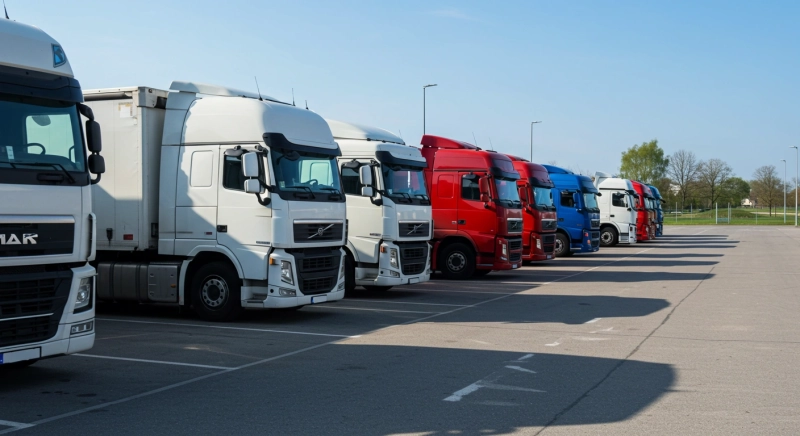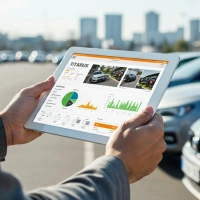
What is Fleet Management?
Fleet management , in its simplest definition, is a strategic approach that covers the entire life cycle of a company’s fleet of vehicles (cars, trucks, buses, construction equipment, etc.). It is much more than just knowing where the vehicles are. Fleet management covers a wide range of issues, from vehicle acquisition to maintenance, from fuel consumption to route optimization, from insurance and inspection status, from driver performance to regulatory compliance.
What are the Basic Components of Fleet Management?
There are many important components and stakeholders behind an effective fleet management system . These components ensure that the system runs smoothly and efficiently:
- Fleet Managers: Individuals responsible for all fleet operations.
- Drivers: Essential personnel who operate vehicles and run daily operations. They play an important role in safe driving, vehicle maintenance and route tracking.
- Maintenance Teams/Service Providers: Responsible for the regular maintenance and repair of vehicles. They fix malfunctions, plan periodic maintenance and minimize the time vehicles spend on the road.
- IT and Software Specialists: They deal with the installation, integration and maintenance of fleet management software and systems. They provide data flow and reporting.
- Suppliers and Vendors: External stakeholders who provide supplies such as fuel, spare parts, tires and new vehicle purchases.
What are the Tools and Systems Used in Fleet Management?

Modern fleet management solutions integrate the many tools and systems that technology has to offer.
GPS Based Fleet Tracking Systems: Allows to track real-time location, speed, stop times and routes of vehicles. This is a basic tool for fleet tracking .
- Fleet Management Software (FMS): Combines many features such as maintenance planning, fuel consumption tracking, driver performance analysis, cost management and reporting in a single platform.
- Telematic Devices: These are equipment that collects data from the vehicle and transmits detailed information such as driving behavior (sudden braking, acceleration), engine performance and fault codes.
- Fuel Management Systems: Prevents waste by tracking fuel purchases, consumption and costs.
- Tire Management Systems: Monitors pressure, temperature and wear to extend tire life and optimize performance.
What are the Advantages of Fleet Management for Businesses?
Effective fleet management offers businesses many tangible and measurable benefits:
- Cost Reduction: Total operating costs are reduced through optimising fuel consumption, reducing maintenance costs, reducing insurance premiums and operational efficiency.
- Increased Efficiency: The efficiency of vehicles and drivers increases through route optimization, reduced idle time, and better planning.
- Safety Improvements: Thanks to driver behavior monitoring, regular maintenance and emergency response capabilities, accident risks are reduced and employee and load safety is increased.
- Legal Compliance: Keeping track of legal requirements such as vehicle inspections, insurance and driver's licenses becomes easier.
- Reducing Environmental Impact: Reduced carbon footprint thanks to reduced fuel consumption and optimized routes.
- Customer Satisfaction: Customer satisfaction increases through faster deliveries, accurately estimated arrival times and reliable service.
What Titarus Offers You in Fleet Management

Titarus offers you comprehensive fleet management solutions by digitizing and optimizing your business’s fleet operations from start to finish. Whether you are a car rental focused business or have a large vehicle fleet, you can maximize your operational efficiency with Titarus’ innovative system.
With Titarus' fleet management solutions you will get:
- Comprehensive Contract Management: Manage your fleet rental contracts quickly and neatly. Streamline your reservation system by easily viewing your open, overdue or on-route vehicles.
- Smart Tracking and Monitoring: Track your vehicles GPS location, speed, route and engine status in real time with advanced vehicle tracking integration . This way, you can have instant access to all information and maintain operational control.
- Automatic Reminders and Notifications: Do not miss important processes such as service or inspection by sending automatic e-mail and SMS reminders for the vehicles in your fleet.
- Financial Management and Integrations: Effortlessly perform bulk invoicing transactions at the end of the month or at the beginning of the month for all your contracts. Additionally, while you can quickly access transition and violation information with HGS integration, strengthen your customer relations with call center integration.
- Detailed Reporting and Analysis: Manage vehicle management, service and maintenance processes, and policy management from a single platform. Measure your fleet performance, reduce costs, and make strategic decisions with detailed reports and analysis offered by Titarus.
- Centralized Management and Integration: Manage your core business processes such as accounting, customer relations (CRM) and human resources in an integrated manner via the Titarus platform. Gain full control over your operational processes by defining your different branches and processes.
With Titarus, fleet management ceases to be just an expense item, it becomes a strategic asset of your business. Reduce your costs, increase your efficiency and gain competitive advantage in your sector by optimizing your fleet operations.























